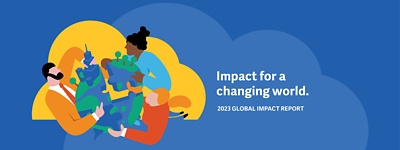Our People
We know employees are at their best when they feel a sense of belonging and have equitable opportunities to grow and thrive. That’s one reason we’ve led with a skills-first people strategy, which includes our skills-based career hub that allows employees to access gigs and learning opportunities and to find potential connections who can help with skills development.
Our talent philosophy puts employees at the center of their performance journey, and we provide the tools to further their careers. One tool we use isWorkday Peakon Employee Voice, a continuous listening platform that surveys employees every week on a subset of engagement, wellbeing, and belonging questions. This provides real-time data to people leaders on team sentiment and recommends actions based on employee responses. Overall, the data helps us improve our culture, support productivity in roles, and simplify everyday employee experiences.
Company participation in Workday Peakon Employee Voice surveys averages around 70% each week. We’ve collected over 300,000 employee comments, over 250,000 people leader responses, and over 1,000 people leader actionscompleted in response to feedback, making this one of the largest standardized datasets ofemployee sentiment feedbackin the world. Furthermore, our employee engagement score puts us in the top 10% of software and services companies globally.2
Belonging and Diversity
Fostering a supported and welcoming workforce is essential to creating a powerful employee-first culture. We’re committed to value inclusion, belonging, and equity (VIBE™) for all, which is critical to our success and creates an environment where all employees are valued for their unique perspectives, respected as equal and integral, and given fair access to opportunity.
In 2020, we announcedVIBE™ commitmentsto support our continued belonging and diversity initiatives and progress. We’ve made strong progress on those commitments, and in support of our journey to improve inclusion, belonging, and equity for all, we’ve developed new VIBE goals that focus on action, accountability, and impact.
We’re focusing our new goals in three areas:
Inclusion.We’re seeking to increase inclusive capabilities, behaviors, and practices throughout the organization. Demonstrating this includes creating access to opportunities in fair and just ways. Essential to meeting our inclusive hiring goals is ourOpportunity Onrampsprogram, which addresses the reality that talent is everywhere, but opportunity is not. Through Opportunity Onramps, talented people gain valuable training through our internships and are positioned to pursue a career in tech.
Another example is our talent acquisition teams. They're reviewing their end-to-end processes to help drive equitable hiring practices for all. They've also developed strategic partnerships with organizations focused on supporting untapped and underrepresented talent to better align Workday as an employer of choice.
Belonging.Our goal is to strengthen our culture where all employees feel like they belong, and we’re committed to supporting this throughout our Workday community.
Reporting from ourWorkday Peakon Employee Voicecontinuous listening platform indicates we’re in the top 10% of our industry benchmark for belonging and satisfaction. We’re striving to increase employee confidence scores in Workday Peakon Employee Voice in all three of our focus areas: belonging, inclusion, and equity.
Equity.Our goal is to balance diverse representation by infusing VIBE in development, enablement, hiring, promotion, performance management, and retention practices; we’ll measure equity through increasing representation of underrepresented backgrounds. While we have made notable progress with certain communities, we will continue focusing on attracting and retaining talent from historically underrepresented communities by increasing their representation across the organization and in leadership roles.
As part of our VIBE goals in 2023, we’ll also continue to focus on improving our gender representation, which includes increasing the representation of women globally and their advancement in senior leadership roles. For example, our VIBE Council representing employees in Europe has developed mentorship and training programs focused on empowering women to move into uppermanagement positions, which supports our global aim to increase gender equality in senior leadership roles. We’ll also work to improve equity in our advancement processes to leadership positions for our Asian employees.
Social Impact
Giving back is in our DNA, and we aim to support causes our employees care about most. Annually, employees participate in a program calledWorkforce Week™,我们最大的员工志愿者活动和Workday tradition since 2015. During the volunteer week, employees meet one-on-one with job seekers to help with job interview confidence, talk through resume questions, and more. Building this social capital and having access to a network of professional relationships is important for job seekers, yet many in this talent pool aren’t offered these opportunities because of life experiences, ZIP codes, and previous work experience. Workforce Week removes these barriers to help create access and equity for all.
In addition, last year we introduced an initiative calledBright Days Offto make it easier for employees to give back. We offer up to three days per calendar year for employees to volunteer with the charities of their choice.
Employees logged more than 53,600 volunteer hours in FY23.
Workday matches employee volunteer hours logged with donations, so employee volunteer hours have resulted in over $1.2 million donated to nonprofits in FY22 and FY23.
For our charitable donation matching gift program, Workday matches employee donations to qualified charities, up to US $1,000 or equivalent per employee, per year; this has resulted in $12.3 million in donations since 2013, and over $1.9 million in FY23 alone.
Our Workday Foundation efforts are also a key piece of our social impact. For many years, the Workday Foundation has made annual donations to organizations responding to natural disasters. We expanded this preventative grantmaking portfolio to include nonprofits in public health and social justice, allowing organizations to invest in prevention and respond quickly when events arise.
In addition, the shift from fossil fuels to green alternatives creates the need for reskilling workers for the green jobs of tomorrow. We’ve invested $1 million in organizations, including theJust Transition grant fund, to retrain workers for emerging green jobs.













